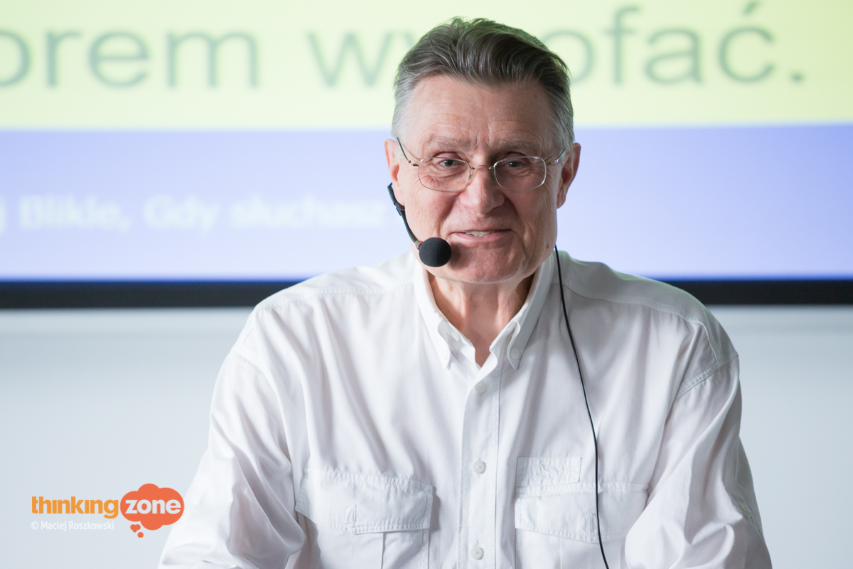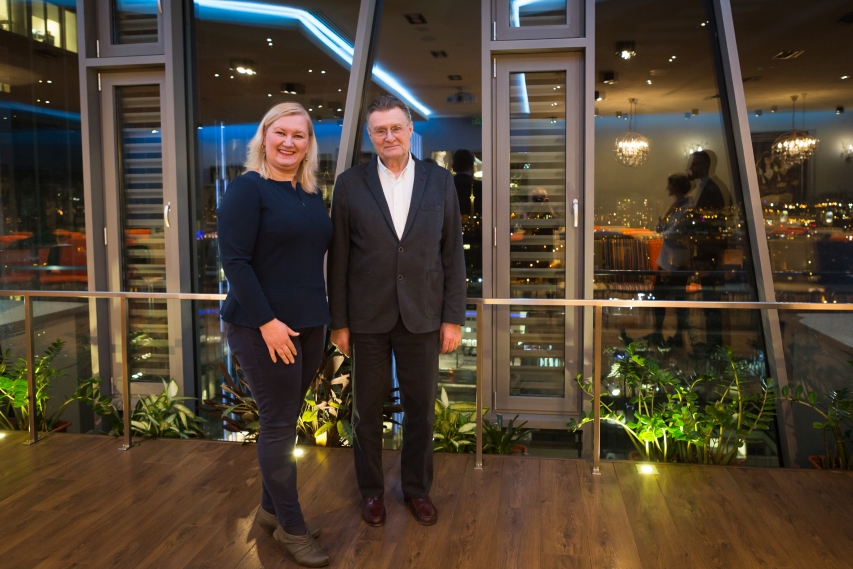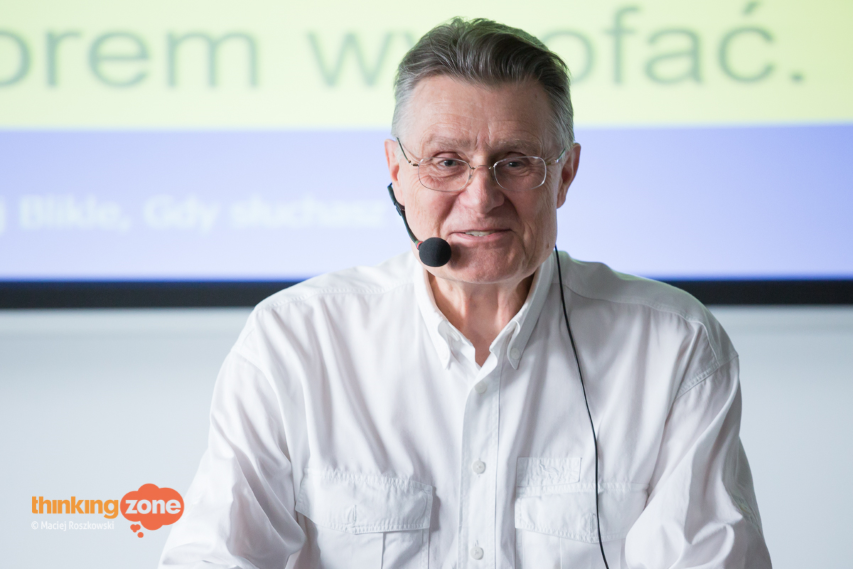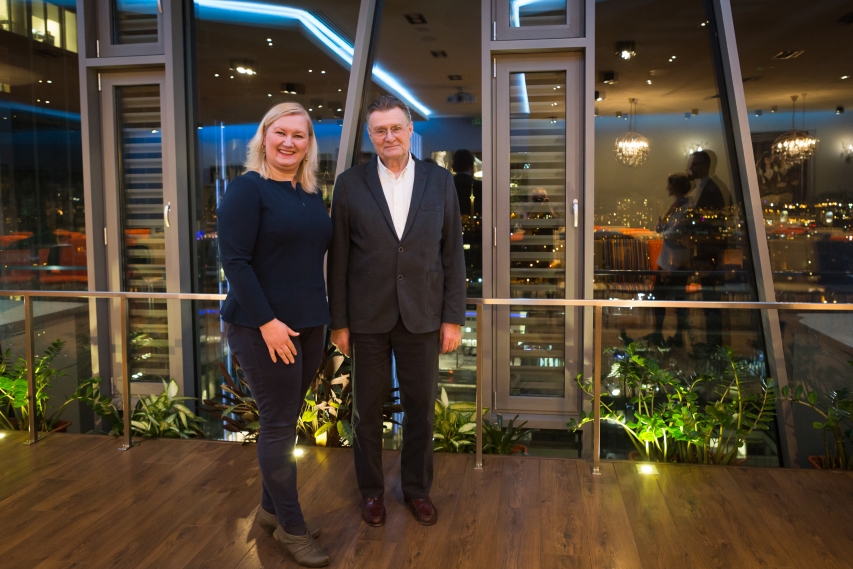Turkusowa samoorganizacja – nowy paradygmat pracy
Jest środa, mroźny lutowy wieczór. Sala Olivia Sky Club jest wypełniona po brzegi. Goście czekają na rozpoczęcie wykładu prof. Andrzeja Bliklego „Porozmawiajmy o Turkusie!”. Wykład zorganizowali Joanna Roszkowska i Maciej Winiarek założyciele Thinking Zone – szkoły podstawowej, gimnazjum i liceum.
Wcześniej tego dnia, w przestrzeni Coworkingu O4, gdzie mieści się Thinking Zone, obył się kilkugodzinny warsztat „Turkusowa samoorganizacja – nowy paradygmat pracy” prowadzony przez prof. Bliklego dla dyrektorów trójmiejskich szkół.
Uczestnikami obydwu wydarzeń było ponad 200 osób – nauczyciele i dyrektorzy szkół, rodzice, przedsiębiorcy. Profesor Blikle opowiadał o tym, jak wygląda praca w turkusowych organizacjach i zarządzanie nimi. Ta wiedza, jak mówią organizatorzy spotkania, może stać się dla wielu inspiracją do zmiany sposobu myślenia, komunikacji, nawet życia…
Co stanowiło motywacją do podjęcia się organizacji tych wydarzeń przez twórcy Thinking Zone? „Kierujemy się wartościami, które są zbieżne z wartościami turkusu: dziel się informacją, otaczaj się partnerami, szukaj współpracy, nie ustawaj w rozwoju. Taki kurs obraliśmy w naszej szkole, takim podejściem zarażamy nasze otoczenie, tak tworzymy kulturę myślenia i partnerstwa” – mówią nam Joanna Roszkowska i Maciej Winiarek.
Od czego zacząć wprowadzenie w życie koncepcji turkusowego zarządzania?
Podstawowe zagadnienia zarządzania turkusowego zostały zawarte w książce Frederica Laloux „Pracować inaczej”. W „organizacji turkusowej” tradycyjne zarządzanie ustępuje partycypacyjnej samoorganizacji. Prof. Andrzej Blikle jest ambasadorem ww. koncepcji w Polsce i wspiera liderów firm w procesach kreowania wysokiej kultury biznesu oraz jakości w ogóle. Jest także autorem książek prezentujących szczegółowo tematykę turkusu: „Doktryna jakości. Rzecz o skutecznym zarządzaniu” i „Doktryna jakości. Wydanie II turkusowe. Rzecz o turkusowej samoorganizacji”.
Korzyści wynikające z wdrożenia turkusu w życie wg profesora A.Bliklego
„Nie jest więc prawdą, jak zdarza się niekiedy słyszeć, że radość z pracy jest luksusem, na który dziś nas nie stać. Jest wręcz przeciwnie, gdyż to brak tej radości generuje spore koszty i to zarówno emocjonalne jak i materialne. W zespole opartym na podejrzliwości i przemocy, miast współpracy mamy walkę, uprawiamy gry, niszczymy się wzajemnie i w rezultacie jesteśmy nieszczęśliwi, a nasze działanie przynosi rezultaty mierne lub wręcz destrukcyjne.
Pierwsze prawo grawitacji społecznej mówi, że ludzie mający do siebie zaufanie i działający z pobudek godnościowych lepiej realizują postawione im cele.
Dlaczego więc szczęśliwe współdziałanie nie jest dziś tak powszechne, jak by na to zasługiwało? W moim przekonaniu głównym powodem jest opaczne wyobrażenie o mechanizmach motywacyjnych, a stąd i o roli lidera w zespole.
Wszystkie bowiem szeroko stosowane „motywatory” spod znaku kija i marchewki (premie, prowizje, bonusy itp.) nieodmiennie prowadzą do sytuacji, którą nazywam grą wojenną pomiędzy silnym, który trzyma kij lub marchewkę, a słabym, wobec którego są te zabiegi stosowane. Zresztą różnica pomiędzy kijem i marchewką jest jedynie pozorna, gdyż uniknięcie kija działa jak marchewka, a pozbawienie marchewki — jak kij.
Zaganianie do pracy kijem lub marchewką powoduje też, że dla słabego pozyskanie marchewki lub uniknięcie kija staje się najważniejszym celem i to celem, który uświęca środki, gdyż kij i marchewka niejako automatycznie wyłączają wewnętrzną motywację do działania. Uczeń, który uczy się dla stopnia, a nie dla pozyskania wiedzy, swoją pomysłowość koncentruje na ściąganiu.”*
Rozmowa z prof. Andrzejem Blikle
O tym, jak rozwijać potencjał firm i ludzi, dlaczego warto otwierać się nowe idee i działania i jak odnaleźć drogę ku dobremu życiu, bez czekania na emeryturę rozmawiamy, w ramach cyklu „Rozmowy Olivii”, z prof. Andrzejem Blikle.
Monika Bogdanowicz (Ekspert Komunikacji, Olivia Business Centre): Obserwując życie Pana profesora widać, że działał Pan na wielu polach aktywności zawodowej. Był Pan biznesmenem, nauczycielem, wykładowcą i ma Pan na swoim koncie wiele sukcesów. Jakie są Pana ulubione smaki w życiu, czyli co warto robić, aby życie miało dobry smak. Jaka jest Pana recepta na szczęśliwe życie, o którym ludzie marzą?
Profesor Andrzej Blikle: Recepta na szczęście jest jedna, ale są różne możliwości jej realizacji. Uważam, że trzeba robić to, co lubimy robić. I to radzę też przede wszystkim młodym ludziom. Kiedy wybieracie zawód, zastanówcie się bardziej nad tym, co byście chcieli robić niż na czym można zarobić. Jeżeli robicie coś, co lubicie robić, to będziecie robili to dobrze, a jeśli będziecie robili dobrze, to znajdzie się na waszą pracę zapotrzebowanie. Mówiłem o tym podczas wykładu w Olivia Business Centre. Trzeba postarać się o dobre życie na co dzień, a sukces i pieniądze zwykle przychodzą w konsekwencji. Smakowanie życia to robienie przede wszystkim tego, co się lubi, a jak się lubi, to się umie, a więc robi dobrze. Wtedy też się doskonalimy, a wiadomo, że mistrzostwo możemy osiągnąć tylko w obszarze swoich talentów. Warto się poświęcić temu do czego mamy talent, tylko trzeba umieć go rozpoznać. Z talentem często jest tak, że jak bardzo coś lubimy to uważamy, że jest to nasz talent. Chciałbym to jednak uściślić. Trzeba robić to, co się lubi, ale w takim sensie, że ma to być naszą pasją. Bo na przykład ludzie mówią tak: „A ja lubię sobie siedzieć w barze, więc otworzę drink bar i będzie super”. Ale wtedy się najczęściej okazuje, że siedzenie w barze jako jego prowadzący, to nie to samo, co siedzenie jako klient. Trzeba znaleźć zajęcie, które będzie nas zachęcało do działania, które będzie nam „wypłacało” nagrodę godnościową. Dlatego trzeba się zastanowić, co mogę robić, by mieć z tego satysfakcję. Bo to jest najważniejsze źródło motywacji do działania.

fot. Maciej Roszkowski, We Love Photo, na zdjęciu prof. Andrzej Blikle podczas warsztatu „Turkusowa samoorganizacja – nowy paradygmat pracy”
M.B.: Obecnie musimy dokonywać każdego dnia setek wyborów, w każdej dziedzinie: od spraw codziennych po najważniejsze kwestie związane z decyzją o drodze rozwoju kariery czy biznesu. Setki możliwości w każdym temacie dotyczącym naszego życia. Czy nieograniczone pole możliwości, jakie oferuje nam współczesny świat jest dobre czy może za dużo opcji utrudnia wybór, który może zakończyć się sukcesem
A.B.: Nie stawiałbym pytania w ten sposób, czy jest to dobre, że świat jest taki, jaki jest. Taki jest i trzeba sobie z tym radzić. Jednakże są różne profile emocjonalne. Jedni chcą mieć bardzo duży wybór, a drudzy wolą, gdy ktoś im w tym wyborze pomoże. Jedni chcą dużo mieć, a inni wolą mieć mniej, bo posiadanie wiąże się z różnymi obowiązkami (np. o samochód trzeba dbać) i zagrożeniami (mogą go nam ukraść). Dziś, zwłaszcza młodzi ludzie uważają, że wielu rzeczy nie warto posiadać na własność. Trzeba mieć tylko możliwość ich używania. Myślę, że to jest dobry kierunek. Nie mam samochodu, a kiedy potrzebuję gdzieś pojechać, zamawiam go w prosty sposób przez aplikację w telefonie. Znajduję auto za rogiem, jeżdżę tak długo, jak chcę i zostawiam, gdzie chcę. Taka opcja nie jest jeszcze w Polsce powszechna, ale w wielu krajach już jest. W ten sam sposób korzystać można z dóbr luksusowych, np. wypożyczyć krawat z najwyższej półki na jeden wieczór lub damską torebkę jednej z najdroższych marek. W ten sposób na jeden weekend można mieć, za np. 30 funtów, rzecz kosztującą kilka tysięcy, na kupno której nie byłoby nas stać. A tak możemy ją mieć i użyć zgodnie z potrzebami. Myślę, że ten kierunek, trend będzie się rozwijał.
M.B.: Kogo chce słuchać i kogo słucha dzisiaj polski biznes? Kim są dzisiaj kluczowi ekonomiści, doradcy czy przedsiębiorcy, których najchętniej słuchają polscy liderzy, menedżerowie firm?
A.B.: O, to jest bardzo różnie. Nie ma jednej odpowiedzi na to pytanie. Moje doświadczenie jest takie, że co menedżer to inne oczekiwania. I trzeba pamiętać o tym, że ekonomia, tak bardzo ważna w biznesie, nie jest wiedzą o zarządzaniu. To są dwie różne dziedziny. Tak jak informatyka nie jest elektroniką. Oczywiście, biznesmeni słuchają ekonomistów, tych dobrych i ważnych, a czasami słuchają i tych, którzy mówią rzeczy niemądre. Taką, moim zdaniem bardzo szkodliwą myśl sformułował np. Milton Friedman, któremu jako nobliście z ekonomii ludzie uwierzyli. On powiedział, że „głównym celem każdej organizacji gospodarczej jest maksymalizacja zysków”. Dlaczego uważam, że to jest niemądre? Dlatego, że celem firmy jest to, co sobie właściciele za cel wybiorą. Kropka. Prawem ekonomii jest natomiast, że zysk jest koniecznością, ale to nie znaczy, że musi być celem. Żeby żyć, trzeba jeść (konieczność), ale kto żyje po to, aby jeść (cel), żyje krócej. Z firmami jest podobnie. Jedna z nich nazywała się Enron, druga – Lehman Brothers. A takich przykładów jest znacznie więcej.
M.B.: To kto według Pana jest autorytetem dla polskich przedsiębiorców, w tym także dla Pana?
A.B.: Nie można mówić pewnie o jednym autorytecie. To jest trudne zadanie, przedstawić inspirujące osoby. Nie wymienię tutaj wszystkich bardzo ważnych profesorów od biznesu, bo pewnie bym kogoś pominął. Mogę mówić kto dla mnie był inspiracją. William Edwards Deming, Peter Ferdinand Drucker, Alfie Kohn – czytałem wiele książek tych autorów. Bardzo, bardzo sobie cenię to, czego nauczyłem się od Marka Kosewskiego – psychologa społecznego, który zajmował się psychologią biznesu. Polecam państwu jego książkę „Wartości, godność i władza. Dlaczego porządni ludzie czasem kradną, a złodzieje ujmują się honorem”. W tej chwili bardzo ważna dla mnie książka, z której dowiedziałem się mnóstwa ważnych rzeczy, to pozycja profesora Rafała Ohme, „Emo Sapiens”, napisałem także jej recenzję, którą znajdziecie państwo na mojej witrynie. Wiedzę trzeba czerpać z różnych źródeł. Polecam na przykład zapoznanie się z działalnością Jacka Jakubowskiego i Doroty Jakubowskiej, twórców Grupy TROP, którzy są dla mnie źródłem nieustającej inspiracji. M.in. prowadzą projekt „Porozumienie na rzecz empatii”. Bardzo wiele się od nich nauczyłem. Nie mógłbym też pominąć Jacka Santorskiego, od lat jest źródłem wielu moich inspiracji. Inspiratorzy mogą swoim niestandardowym myśleniem wpłynąć znacząco na nasz rozwój. Polecam szukanie takich przewodników na swojej drodze.
M.B.: Pana motto pochodzące z „Konstytucji wolności”**, odnoszące się do działalności misyjnej w obszarze promowania idei wysokiej jakości zarządzania brzmi: „Rozwój polega na tym, że nieliczni przekonują wielu. Nowe myśli muszą się gdzieś pojawić, zanim będą mogły stać się poglądami większości”. Czy pana działalność propagowanie organizacyjnego turkusu, który kulturze folwarku przeciwstawia demokrację, partnerstwo i skracanie dystansu ma szansę na dobrą adaptację w polskim biznesie i jaka jest skala takiej formuły organizacji w Polsce?
A.B.: Nie wiem, czy ktokolwiek prowadził w Polsce badanie na ten temat. Wiem, że jest osoba, która się tym zajmuje w Wyższej Szkole Finansów i Zarządzania w Warszawie i zamierza zrealizować takie badania. Chce sprawdzić, jak wygląda populacja polskich firm w naszym kraju. Z własnych obserwacji mogę powiedzieć, że w trakcie moich ponad 80 spotkań rocznie – podobnych do tego w Olivii – podchodzi do mnie 1 do 5 osób, które mówią, że już tak organizują swoją pracę. Rocznie spotykam więc około 200-300 osób aktywnie myślących o stylu turkusowym. A jeszcze kilka lat temu takich wypowiedzi nie słyszałem. Świadczy to o rosnącej skali tego zjawiska w Polsce.
M.B.: Czy liderzy polskich firm chcą wychodzić poza schemat mentalny i dotychczasowe sposoby działania? Czy są otwarci na te idee i czy chcą je podjąć?
A.B.: Jedni chcą, inni nie. Wiadomo, że to jest nowość. Z drugiej strony syndrom gospodarki folwarcznej jest bardzo powszechny, chociaż trudno mi powiedzieć, czy jest przeważający. Niektórzy tak uważają, np. Jacek Santorski. System folwarczyny jest wysoce antydemokratyczny. Turkus to nie jest demokracja większościowa, gdzie większość ma z zasady rację. Mówiąc w wielkim skrócie, turkus to podejmowanie w każdej sprawie decyzji przez tę mniejszość, która się na danej sprawie zna. Za każdym razem może to być więc inna mniejszość. Nie są to rządy mniejszości, ale partycypacyjne podejmowanie decyzji w atmosferze zaufania. Natomiast w demokracji jest tak, że decyzję podejmuje większość, która przecież nie może znać się na wszystkim.

fot. Maciej Roszkowski, We Love Photo, na zdjęciu: Monika Bogdanowicz (Olivia Business Centre), prof. Andrzej Blikle
M.B.: Sceptycy mówią, że nie wierzą w firmy, które nie mają szefów.
A.B.: Każdy ma prawo nie wierzyć nawet w to co istnieje. Kiedy Ludwig Pasteur ogłaszał swoje odkrycia, wielu lekarzy nie wierzyło w istnienie mikrobów. Z drugiej strony słowo „szef” jest bardzo pojemne. Myślę, że każdy zespół potrzebuje liderów, liderów idei, liderów społecznych, liderów, którzy ludzi inspirują. Tacy ludzie są potrzebni, bo zespół, w którym nikomu na niczym nie zależy nie będzie dobrze działać. Liderzy są potrzebni, ale nie jeden naczelny i nieomylny lider, ale wielu. W każdej sprawie inny. Wtedy jest fantastycznie.
M.B.: Jakie są znane w Polsce dobre przykłady firm turkusowych?
A.B.: Jak już mówiłem, spotykam takich firm wiele. Niektóre są opisane na mojej witrynie. Są wśród nich Marco, Mentax, Brewa i KamSoft Podlasie. To nie są duże firmy, ale ostatnio dowiedziałem się, że turkus buduje polski oddział międzynarodowej korporacji Decathlon. Turkusowe jest też polskie Sodexo. Wiele firm nie zna jeszcze tej metody, jest to więc dla nich nowość. Z turkusem w Polsce jest bardzo różnie. Niektórzy o nim słyszeli i uważają, że to idiotyczne. Inni słyszeli i chcą iść w tym kierunku. Wszystko zależy od świadomości liderów, którzy decydują o przyszłości organizacji.
M.B.: Czy są jakieś zagrożenia dla firm związane z wyborem turkusu? Nie wszystkie firmy chcą przecież zmieniać świat.
A.B.: Zagrożenie jest przede wszystkim takie, że jest to daleko idąca rewolucja. Jeżeli się ją robi nieumiejętnie to można wpaść choćby w tzw. nowomowę. Ludzie zaczynają mówić tak, jak się kiedyś mówiło w PRL: „ze Związkiem Radzieckim na czele”. I czegokolwiek by się nie powiedziało, kiedy zakończony słynnym „ze Związkiem Radzieckim na czele”, to już nie było dyskusji. Turkusowa nowomowa polega na powtarzaniu sloganów bez dbałości o stosowanie się do nich w codziennej praktyce. Jeżeli firma nie zda sobie z tego sprawy to ludzie zaczynają traktować turkus jako kolejną manipulację ze strony dyrekcji. Gdy raz się wjedzie na tę drogę, trudno jest z niej później zawrócić.
M.B.: Zaufania nie można przecież zadekretować…
A.B.: Stanowczo nie można!
M.B.: A w jaki sposób możemy rozpoznać autentyczność wdrożenia tej metody a nie tylko deklaratywne podejście w otoczeniu biznesowym?
A.B.: Trzeba rozmawiać z ludźmi szczerze, ale przedtem trzeba doprowadzić do tego, żeby byli z nami szczerzy, co nie jest wcale takie proste. Ja zresztą nigdy nie mówiłem, że to jest proste. Mówiłem, że to jest skuteczne i że warto, ale proste z pewnością nie jest.
M.B.: Mówi pan „Powtarzam wszystkim, że nie warto się przejmować rzeczami, na które nie ma się wpływu”. Skąd czerpie pan siłę do codziennej tak intensywnej aktywności?
A.B.: Trenuję cały czas. Trenuję uczenie – mam średnio dwa szkolenia tygodniowo, przez cały rok. Czasami to jest pół godziny, czasami dwie, a czasami nawet dziewięć godzin jednego dnia. Więc dużo wykładam, ale też uprawiam dużo sportów: narciarstwo zjazdowe i ski-alpinizm i to moje sporty numer jeden, ale także windsurfing, rower górski, wiosłowanie na skifie (tzw. olimpijska jedynka), a w zimie w mieście siłownia. Sporty zawsze były obecne w naszej rodzinie. Moi rodzice byli sportowcami, nie wyczynowo, ale zawsze w znaczącym wymiarze życia. Polecam sport wszystkim jako ważny element dobrego życia.
M.B.: Dziękuję za spotkanie i inspirującą rozmowę. Mam nadzieję, że przyczyni się ona do wzmocnienia znaczenia idei turkusu w Polsce.
ZOBACZ GALERIE ZDJĘĆ ZE SPOTKANIA:
Warsztat pt. „Turkusowa samoorganizacja”
Wieczór Sky Club – wykład pt. „Porozmawiajmy o Turkusie!”
*„Doktryna jakości, wydanie II turkusowe. Rzecz o turkusowej samoorganizacji”, więcej na http://www.moznainaczej.com.pl/137-dzialania/moja-ksiazka?start=12
**„Konstytucja wolności” – książka uznawana za jedną z najwybitniejszych współczesnych prac z filozofii polityki, XX-wieczny odpowiednik O wolności Johna Stuarta Milla! Autor – Friedrich August von Hayek, laureat Nagrody Nobla w dziedzinie ekonomii, omawia w niej swoją teorię neoliberalizmu, w której centralne miejsce zajmuje problem wolności indywidualnej, pojmowanej jako niezależność lub brak przymusu. Autor, krytykuje teorie wolności politycznej jako mocy oraz możliwości spełnienia osobowości czy dobrobytu. Łączy wolność osobistą jednostki z funkcjonowaniem wolnokonkurencyjnej gospodarki opartej na prawie popytu i sprzedaży. Przeciwstawia się klasycznie pojmowanej sprawiedliwości, znajdującej wyraz w regułach podziału dóbr. Uważa, że narzucenie społeczeństwu jakiegokolwiek modelu dystrybucji jest zaprzeczeniem wolności. Sprawiedliwość może być wyłącznie oparta na zasadzie swobodnie zawieranych umów. Wolność indywidualna jest według autora warunkiem koniecznym, ale niewystarczającym istnienia ładu społecznego, ponieważ jego treść określają zasady moralne regulujące korzystanie z wolności i niekwestionowalne zasady prawne, wiążące wolę większości. Hayek analizuje, w jaki sposób społeczeństwa zachodnie bronią wolności indywidualnej. Porównuje system rynkowy i opiekuńczy. To wciąż żywo dyskutowana krytyka współczesnego społeczeństwa, która weszła do kanonu lektur nauk społecznych i politycznych.
–/–
Prof. Andrzej Blikle – matematyk, informatyk, przedsiębiorca. Pracownik Instytutu Podstaw Informatyki PAN, członek Europejskiej Akademii Nauk (Akademia Europaea), Rady Języka Polskiego PAN i ponad 20 innych organizacji. Wykładał w Warszawie, Berkeley (USA), Waterloo (Kanada), Linköping (Szwecja), Lyngby i Kopenhadze (Dania). Członek założyciel, były prezes, a dziś członek honorowy Polskiego Towarzystwa Informatycznego. Były prezes Polskiej Federacji Producentów Żywności. W latach 1990-2010 prezes zarządu A.Blikle Sp. z o.o., dziś członek rady nadzorczej tej firmy. Były prezes zarządu stowarzyszenia Inicjatywa Firm Rodzinnych, a dziś jego honory prezes. Również honorowy prezes Centrum im. Adama Smitha.
William Edwards Deming – amerykański fizyk, który zrewolucjonizował metody zarządzania w oparciu o filozofię jakości nazwaną TQM (Total Quality Management). Mawiał: „Jakość jest obowiązkiem każdego z nas.”
Peter Ferdinand Drucker – ekspert ds. zarządzania, wykładowca akademicki, badacz procesów organizacji i zarządzania w korporacjach oraz organizacjach non-profit. Uważany za jednego z najwybitniejszych myślicieli i teoretyków zarządzania XX wieku.
Alfie Kohn – amerykański badacz interdyscyplinarny, specjalizujący się w tematyce edukacji i wychowania. Jego pola zainteresowań to zagadnienia motywacji, współpracy i długoterminowych skutków strategii wychowawczych. Znany przeciwnik ocen w szkołach i rywalizacyjnego podejścia do nauki.
–/–
Materiały fotograficzne dzięki uprzejmości Macieja Roszkowski z We Love Photo oraz Thinking Zone.





